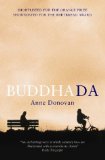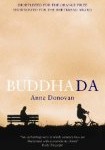
Short Listed for the 2003 Orange Prize
Buddha Da is a lovely story about a working-class Glaswegian man who decides to convert to Buddhism. The book follows his every day life as he begins be appreciate the benefits of simple living and meditation. His family don’t understand his desire for a more meaningful life and this causes them to drift apart.
The book is written entirely in dialect and I have a feeling that those unfamiliar with the Scottish way of pronouncing things may struggle with this book. Here is the first paragraph so you can see how you’d get on:
Ma Da’s a nutter. Radio rental. He’d dae anythin for a laugh so he wid; went doon the shops wi a perra knickers on his heid, tellt the wifie next door we’d won the lottery and were flittin tae Barbados, but that wis daft stuff compared tae whit he’s went and done noo. He’s turnt intae a Buddhist.
For those who are struggling: Radio rental is rhyming slag for mental, meaning mad.
It took me a little bit of time to get used to the dialect but after a few pages I started to love it and thought it really added to the atmosphere.
The plot was quite gentle, but there were thought provoking discussions about how to give more meaning to your life and the problem of balancing this with your relationships.
Overall it was a light, entertaining read that I’d recommend to someone looking for something a bit different.
![]()
Did you understand the first paragraph of the book?
Have you read Buddha Da?
Have you read any other books written by Anne Donovan?

38 replies on “Buddha Da – Anne Donovan”
I’m happy you enjoyed this, Jackie; I did too. It’s gentle yet original and has a lovely, worthwhile message. It even took me a few pages to fully grasp the dialect!
I would like to read both of Donovan’s other books; I think my library has Being Emily so probably that one first.
Claire, It is quite reassuring to know that it took you a few pages to grasp the dialect! I think lovely is the right word to describe this book and I look forward to hearing your thoughts on Donovan’s other books.
I really really loved this and didn’t actually struggle too much with the dialect which is unusual for me. I came to it via Being Emily which is quite a different read but really good.
Verity, It is good to know that Being Emily is good. I’ll keep an eye out for a copy.
I understood the para you posted but I had to read it twice. I don’t think I can take it for an entire book. But this does sound like a very different story and I’m glad you enjoyed it.
Violet, I think you get used to the dialect after a while, although I appreciate it would be harder for those who aren’t used to the Scottish dialect. Perhaps this isn’t the right book for you though.
I had my summer book club read this one summer and while it took people varying amounts of time to “get” the dialetc, I think the ultimate verdict was that it was a charming book that everyone liked. I really loved it, personally. And I loved the fact that it made my grandmother tell me that it took her back to her childhood, sitting in her grandda’s lap listening to him with his heavy burr (he was born in Scotland and came to the US as a young man). And now I’m reminded to see what else Ms. Donovan might have written that I can get my hands on.
Kristen, I love the fact that it took your grandmother back to her childhood – family connections lke that make a book so much more special.
This looks really interesting – when I read the paragraph I had no idea what “radio rental” meant but I think I got the idea. I think if I read this I might miss some meaning, but understand enough to appreciate it.
Tricia, There isn’t much rhyming slang in the book, so I think you’d be OK once you get used to the dialect.
Normally I hate novels written in dialect – I am a bit surprised that I was able to read Trainspotting by Irvine Welsh many years ago, since that is also written in the Scottish way.
That said, I really like the idea of behind the novel and would be interested in checking it out. And clearly rhyming slang is worse than dialect, since no amount of reading aloud is going to help me equate radio rental with mental!
Steph, I’m developing a love for books written in dialect – the last few I’ve read have been wonderful. I’d love to know your thoughts on this one, so I hope you decide to read it at some point.
This actually sounds very very interesting. I’d normally stay clear of books like this that are written entirely in slang, but for some reason, that first paragraph wasn’t too difficult, and it actually sounded quite natural!
I love that it’s a book about someone discovering Buddhism, so I might just have a look at this one.
Michelle, I think it is very easy to read once you get used to it. The Buddhism aspect of the book didn’t really appeal to me beforehand, but now I’ve finished the book I would be tempted to read another one on a similar subject. I hope you decide to give it a go.
I’m always a little wary of books written in dialect(after writing a term paper on the Quebecois author Michel Tremblay and his use of joual) but this one does sound intriguing, though I would never have figured out what ‘radio rental’ meant on my own. I’m constantly on the lookout for books set in Scotland, so it will surely be added to the list!
Claire, I have heard that a few books written in dialect are hard work. I guess I’ve just been lucky with the ones I’ve tried so far. I hope you decide to give it a try.
I think that I could get through this O.K., but it might take me longer than usual to read it. Like Trainspotting.
J.T. I didn’t read Trainspotting (enjoyed the film though) I guess it does take longer than normal to read it, but I think that actually improves the book.
I have no problems with dialect and I enjoy the Orange Prize nominees very much. I’m doing a reading challenge for this award so I look forward to reading this now. Yours is the first review I’ve seen of it. Thank you.
Sandra, I’m trying to read all the Oranges too – on the whole they are very good. I think you’ll enjoy this one.
I haven’t heard of this book. Sometimes I need to keep reading a book and then I will get use to the dialect. Sounds like an interesting read.
Jennifer, It only took me a few pages to get used to it – after that it felt very natural. I’m pleased I bought it to your attention.
I think I would struggle with this to be honest … but I suppose I might catch on after a while. It would have to be a really really really good story for me to stick with it though!
Jenners, This probably isn’t for you then. The plot is very gentle, so if you don’t like the dialect I think you’ll really struggle. At least it is another book to cross off the TBR list!
If you liked this, then you should read Hermann Hesse’s Siddhartha. A great German author and a fantastic book! I read it in Germany when I was in high school and I loved it!
Andreea, Thank you for the recommendation – I haven’t heard of that book before. I’ll have to add it to the wishlist.
I admit I do struggle with dialect. I think it’s because you have to read slowly and/or twice to understand and it upsets my natural reading rhythm and speed, which I’d describe as on the fast side of moderate. I gave up on Trainspotting and watched the film instead, so I’m afraid this one doesn’t really attract me. However, I did love Riddley Walker which was written in a degenerate kind of English … Confusing huh!
Annabel, I have heard wonderful things about Ridley Walker. It is on my wishlist, but I haven’t got a copy yet.
I haven’t read Trainspotting, so not sure how the dialect compares, but I imagine they would be similar – although Trainspotting would be ruder!
I don’t think the dialect would be too difficult to follow, since I understood the first paragraph. But I’m not sure the book is for me…
Beth, I’m not really sure what your book taste is – you keep confusing me!
I’ve seen this one around, but the dialect scared me. The first paragraph wasn’t as difficult as I’d been lead to believe. So, even though this would take me some time to get into the rhythm, it sounds like a book I’d enjoy.
JoAnn, I’m glad I reassured you about the dialect. I hope you go on to enjoy the book.
I think this premise looks really interesting and unique. You said the book has “thought provoking discussions about how to give more meaning to your life” which I think would be quite enlightening. I’m not sure I’d be able to handle the dialect, but it would be fun to give it a try.
Kimberly, I’d love to know what you made of it. I hope you decide to give it a go and have fun trying!
This is probably a bit silly, but I’d like to have an American’s perspective on the dialect. I do fine with American-type dialects, but I’m wondering if I’d struggle with the Scottish because I haven’t heard it in real life very much. From the bit you excerpted, I think it might be hard enough to distance me from the story. But I love this concept!
Jenny, I can see why you’d be worried. I am familiar with the Scottish accent so didn’t have a problem. I’d love to know how easy it would be for someone who isn’t to understand it.
[…] Buddha Da – Anne Donovan […]
[…] It’s a little sad, though, that I’ve only managed to read the first few stories in this collection of 20, even though I’ve already been at it for a month or so now. I had thought I would like Buddha Da by Anne Donovan, which I think is an extract from her full-length novel. It’s written completely in dialect, and though it was a little confusing at times, reading it out loud helped quite a bit. I’m not sure I got the point of extracting that bit of the story when a man attended Buddhist camp, but there’s quite a good review of the novel at Farm Lane Books. […]